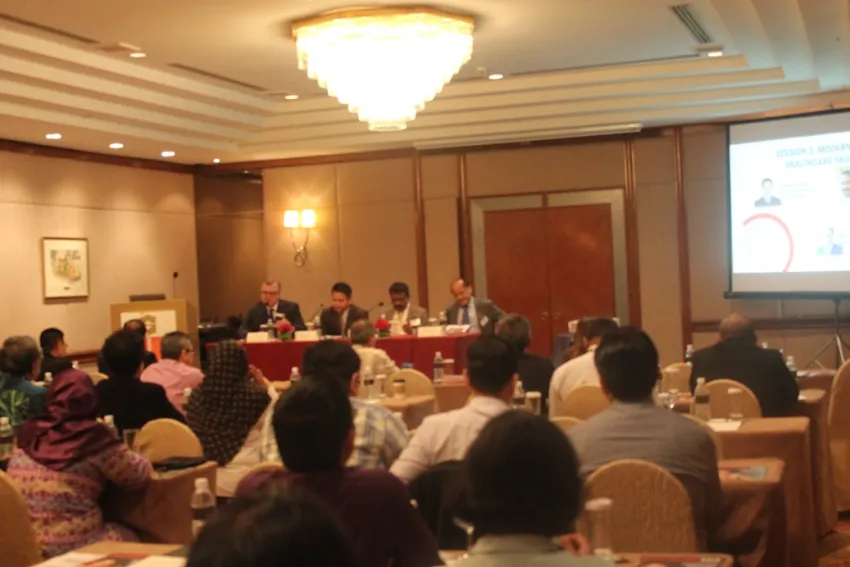
Here's why Malaysia has a long way to go in modernising its healthcare skills and facilities
Keeping up with modern technology was one of the many hot topics discussed at the inaugural Healthcare Asia 2016.
While Malaysia is a top-tier destination for medical tourism in the Southeast Asian region, it has recently been losing out to its neighbors, who often offer more innovative devices and treatments, as well as better-trained staff. Bridging the gap in modernisation was only one of the pressing healthcare issues discussed in the Kuala Lumpur leg of the first-ever Healthcare Asia Forum 2016.
"As far as skills are concerned, Malaysia still hasn't caught up. But still, we have to do more with the little that we have," said Michael Wong, Chief Executive Officer of IMU Healthcare. "Malaysia is quite lacking especially in terms of IT skills. Hospitals in the country are not used to the big budgets required to bring the skills and facilities to the next level" he said.
Wong was joined in a panel discussion by Mahenthiran Thanapal, Director of Business Operations at Prince Court Medical Center and Mohd Azhari Yakub, Chief Executive Officer of Institut Jantung Negara.
"Modernising hospitals does not necessarily mean equipping hospitals with fantastic facades," Prince Court's Thanapal said. "Hospitals in the near future would move away from investing in totally integrated IT infrastructures towards more of using mobile applications and the cloud."
Thanapal added that this shift would be revolutionary for hospitals in terms of costs and easing the operational burden of healthcare institutions by passing it to the customers.
Using mobile applications and leveraging healthcare services using cloud technology was also a focal point for a talk by Christopher Norton, director in the Southeast Asia Consulting practice of PwC as he spoke about healthcare trends and the future of the industry.
"55% [of patients] trust the internet more than the doctor. This is resulting in the emerging of new business models. People who were not involved previously in the healthcare market are trying to disrupt the landscape," Norton said.
Norton adds that with the increasing popularity and success of innovative ventures such as Facebook, Alibaba, and Uber, we may soon be seeing hospitals without patients, or a hospital that has no beds.
"People are moving to the fact that rather than having infrastucture and beds for people to stay in, the way of providing care is constantly evolving," he added.
Norton was also a member of a panel discussion discussing healthcare IT and how the survival of Asia's hospitals hinge upon it. Joining him on the panel were Dato Amiruddin Abdul Satar, President and Managing Director of KPJ Healthcare Berhad, and Ahmad Shahizam Mohd Shariff, Chief Executive Officer of Pantai Holdings Berhad.
"The culture of healthcare is expecting doctors and nurses to spend more time looking at a monitor," said KPJ Healthcare Berhad's Amiruddin. "With this change in culture, what we can see is the reduction of medical errors. Most of the errors that KPJ is facing now are based mainly on the manual systems."
"The challenge in healthcare, is that a lot of factors involved is predicated on long years of experience," said Ahmad Shahizam Mohd Shariff. "And the moment we suggest to put another element to it, it becomes a very different mindset.
To close the forum, Suresh Ponnudurai, CEO of World of Wellness and malaysiahealthcare discussed Aged Care in Malaysia. As a nation faced with a looming silver tsunami, Ponnudurai said that the time is ripe to invest in improving aged care in the country.
"The key is emphasising primary prevention, early intervention, and effective care coordination throughout the spectrum of care," Ponnudurai said.
The panel discussions were all moderated by Healthcare Asia editor Tim Charlton.
The forum's Kuala Lumpur leg was attended by over 60 key people in the healthcare space. Kuala Lumpur is the second stop of the 5-city event which will bring together the industry's key thought leaders in 5 key cities in Asia -- Manila, Kuala Lumpur, Jakarta, Singapore and Bangkok. Find out more about the event here.



















 Advertise
Advertise





